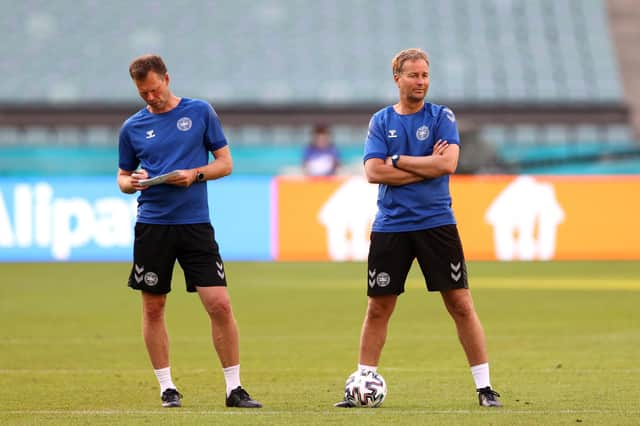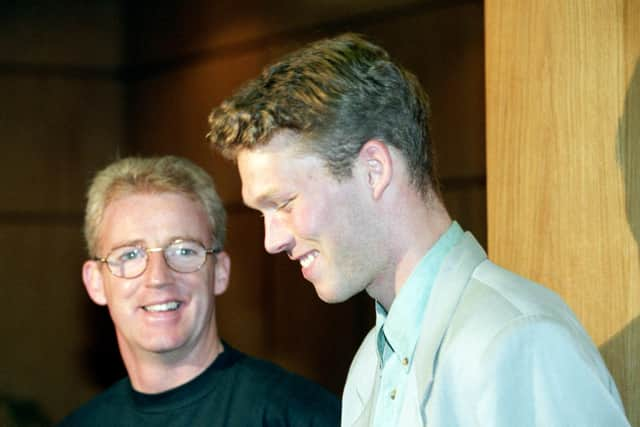The ex-Celtic, kilt-wearing honorary Scot plotting England's Euro 2020 downfall


Not intentionally at least. That is what happened when Morten Wieghorst stepped up to take a spot kick in 2003. It was well reported at the time and, to this day, features high up in lists detailing most heartwarming moments in sport.
Wieghorst’s display of sportsmanship while playing for Denmark against Iran in the New Year Cup in Hong Kong was hailed by the crowd and later recognised by the Olympic Committee in the form of a fair play award.
Advertisement
Hide AdAdvertisement
Hide AdAn Iran player had picked the ball up in the box after mistaking a whistle from the crowd to be the referee’s signal for half-time. After consultation with the then Danish manager Morten Olsen, Wieghorst, the skipper, did the decent if – at that level of football – unexpected thing: he side-footed the ball wide and turned on his heels to get into position for the goal-kick while high-fiving grateful opposition players en route.


Footage of the episode still turns up on social media, which makes it all the more surprising that Wieghorst’s presence on the Danish bench, where he is manager Kasper Hjulmand’s assistant, has been so rarely remarked upon during Euro 2020 to date.
This failure seemed especially notable during coverage of the Denmark v Wales last 16 clash. Wieghorst actually lived in Wales during a year as assistant to Swansea City manager Michael Laudrup.
But when the camera switched to the Danish bench, the tall, what-should-be-familiar figure of Wieghorst was not name checked, despite his close involvement with the main story of the tournament so far. Denmark are still riding a wave of emotion after their talisman Christian Eriksen collapsed during their opening game against Finland.
The former Spurs midfielder has since been fitted with a pacemaker and his future in the game remains unclear. There is plenty of time for that to be ascertained. As for now, Denmark continue to pay tribute to their player by going ever deeper into the tournament.
They have reached the last four of a major finals for the first time since 1992, when they became European champions after being summoned from their holidays to replace Yugoslavia just days before the start of the tournament.
Wieghorst, who turned 50 in February, was playing at newly crowned Danish champions Lyngby at the time but had yet to make his full international debut. He credits Dundee with affording him that opportunity. He made the surprise move to Dens Park in November 1992 as Simon Stainrod continued his imaginative re-building job. He made several eye-catching foreign captures after being put in permanent charge that summer.
But Wieghorst was undoubtedly the classiest of the recruits and he did not take much time to find his feet in the robust world of Scottish football. He scored with a memorable curling shot on his debut as nine-man Dundee came back from 4-2 down to draw 4-4 against St Johnstone.
Advertisement
Hide AdAdvertisement
Hide AdDespite his elegant presence, Dundee were relegated in 1993-94 with Jim Duffy having replaced Stainrod as manager. Duffy built an exciting team around Wieghorst and Neil McCann and Dundee reached their first major final for 15 years in 1995 when they met Aberdeen in the Coca Cola Cup final. Still in the First Division, Dundee proved unnerved by the experience and lost 2-0.
Dundee fans ruefully note that McCann and Wieghorst won man of the awards in the next two League Cup finals - unfortunately, by then they were playing for different clubs. McCann had moved on to Hearts, while Wieghorst joined Celtic under Tommy Burns. The £500,000 fee is said to have kept Dundee afloat – an extra bonus was that Barry Smith, who now sits fourth in the club’s all-time appearances list, was included in the deal.
Forced to vie with the likes of Paul McStay for a place in the Celtic midfield, Wieghorst endured a slow start to his Parkhead career. However, he battled to become a mainstay in 1998’s title win as Wim Jansen’s side thwarted Rangers’ ten-in-a-row attempt. But it’s a triumph that mostly took place off-the-pitch that means Wieghorst deserves to be held in the highest esteem.
Although quite not as dramatic as Eriksen, his health scare was every bit as serious. The midfielder was in intensive care after being struck down with the rare Guillain-Barre syndrome, which attacks the central nervous system, in 2000. He was even put on a ventilator for a spell as his condition deteriorated.
A short video chronicling his return to health and not only that, his return to the Celtic first-team to boot, remains on YouTube. Re-watching it underlines what an achievement it was to feature again just over a year later. The short film charts his journey from shuffling around the gym while barely able to lift the soles of his feet from the ground to scoring for Celtic against Alloa Athletic in his second start following his comeback.
Although he played only another three league games for Celtic, he appeared in another World Cup and was named player of the year for Brondby, the team he joined after leaving Parkhead.
He collected that personal award while wearing the kilt he bought shortly after joining Dundee. This was a nod to the significant part Scotland had played in his recovery process. Whether the BBC Match of the Day team references this quirky detail during tomorrow’s last four clash with England remains to be seen. They surely should.
Scots will of course have an opportunity to be reacquainted with Wieghorst - and his curious Glostrup via Dundee/Glasgow accent - soon enough. If Denmark are knocked out at Wembley tomorrow night, their next competitive match will be a World Cup qualifier against Scotland in Copenhagen at the start of September.
A message from the Editor:Thank you for reading this article. We're more reliant on your support than ever as the shift in consumer habits brought about by Coronavirus impacts our advertisers.If you haven't already, please consider supporting our trusted, fact-checked journalism by taking out a digital subscription. https://www.scotsman.com/subscriptions
Comments
Want to join the conversation? Please or to comment on this article.